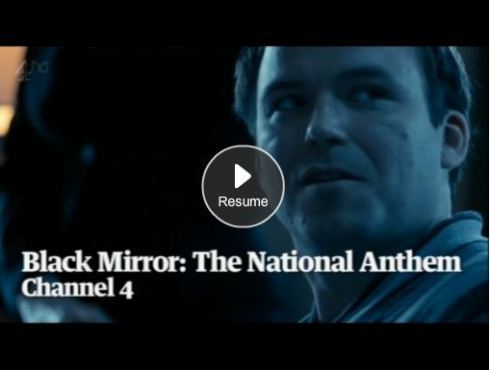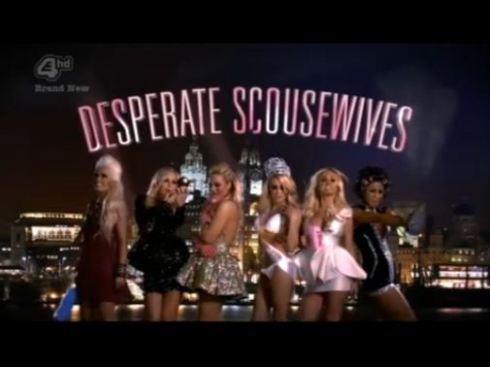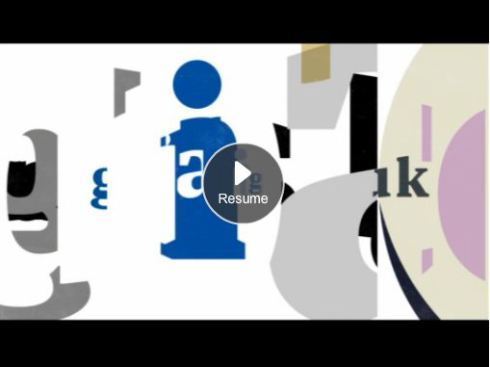Andrew Collins's Blog, page 45
December 10, 2011
Like?
A delicate diplomatic task on this week's Telly Addict: reviewing the work of a Guardian writer – nay, Guardian deity – for the Guardian. Frankly, if I'd really disliked Charlie Brooker's Black Mirror (C4), I would have avoided reviewing it. I didn't dislike it. I have long been an admirer of Brooker's, if not his hair, and so it wasn't as tricky as I'd feared. Anyway, see if you agree with me. I also review BBC2′s Mark Zuckerberg: Inside Facebook and the second season of Bored To Death on Sky Atlantic, yet another fantastic import from the replublic of HBO.
I am currently working on a Top 10 TV Shows for another blog entry, but I have been so busy this week, it's been impossible to justify time spent on non-paying work.

December 3, 2011
Reality used to be a friend of mine
This week's Telly Addict, buried deep within the Guardian website where nobody is ever going to find it without a map, considers the first part of Vanessa Engle's already illuminating new documentary trilogy, Money, on BBC2; my new favourite programme, My Cat From Hell, on Animal Planet; and Desperate Scousewives on E4, the latest example of "scripted reality" which was actually preceded by a warning that it contained strong language and a disclaimier that some scenes were "created for entertainment purposes." (The link to Telly Addict is here.)
A few words on the latter. Because of my commitment to cover all sorts of telly for the Guardian, I've seen quite a few shows this year that I might not ordinarily watch for my own pleasure. Thus, even though I've never seen The Only Way Is Essex, I have seen an episode each of its first copycats, Made In Chelsea and Geordie Shore. (Actually, I couldn't sit through a whole episode of Geordie Shore.) So I understand the format, which was developed on MTV, as I understand it. "Reality" just wasn't entertaining enough, apparently, so they started prodding it and poking it and putting a hat on it until it did things that were more like a soap than a fly-on-the-wall documentary. Unfortunately, although this makes "stars" of the ordinary people it casts in Essex, Chelsea, Newcastle or Liverpool, which is nice for them, and thus provides "celebrity" fodder for the other reality shows like Big Brother and I'm A Celebrity …, it also means that non-actors are now being asked to act for us. And they're shit at it, by and large.
The nobodies on Desperate Scousewives – who, by the way, aren't housewives, or even wives, so the clever title doesn't actually work – may have the natural front of Liverpudlians, but they can't act, and the scenes they are expected to play out, for the "story" of the show, come across like animated Dear Dierdre Photo Casebooks from the Sun. I couldn't get all the way to the end of the first episode without fast-forwarding, as it was literally painful to watch. It's not the fault of the wannabes who sign up for this kind of show – why the hell not? – it's a flaw of the format.
What are we watching? Reality or fiction? This sounds like a much more interesting philosophical conundrum than it actually is. In episode one, the desperates attend something called the Style Awards, which seems like a local bash, attended by local celebrities like Ricky Tomlinson (must have been difficult to get him to come, eh?) and Coleen Rooney, who didn't turn up, even though she won some award or other. Meanwhile, the scousewives act out the latest plotline for the cameras, badly, and we are supposed to care. Actually, half a million people cared enough to watch the first episode, which is a decent audience for E4, so I'm clearly not in its sights.
I do worry about the culture of this country, though. There's a recession on, and our young people are still having the carrot of instant celebrity dangled in their faces as a career path. If some of the "cast" of Desperate Scousewives are lucky, they'll be invited back to the Style Awards next year. Most of them won't. Maybe it should be watched as a tragedy.








December 2, 2011
Prickgate









I'm wary of writing about this yet, as when I read the paper this morning, the BBC had received about 5,000 complaints about Jeremy Clarkson's bons mots on Wednesday night's The One Show, but having just checked the story on the Guardian website, it appears to have snowballed to 21,000. I sincerely doubt he will be sacked, as Jonathan Ross and Russell Brand were, but whether it was a pre-emptive attempt to promote whatever his latest book of columns is called or a more spontaneous glimpse into his soul, the outcome is certainly getting away from him. He left the country for Beijing yesterday, but it's in this country that his human rights are being most severely challenged.
We all "get" Jeremy Clarkson. Whether or not we share his country squire's right-wing views, we know what he's doing. He was once merely a car reviewer on a car review TV programme that took off and became a hugely profitable international brand. In the midst of this, because he was the definitive presenter of that programme (and, I say objectively, a very good one), and because it was his cocky, arch, pause-laden presenting style that had helped brand it, Clarkson also became a brand. They gave him his own chat show. Short-lived, but a mark of the BBC's investment in him. I sincerely hope the Sunday Times gave him a pay rise, as they suddenly had a superstar car reviewer; he was given his own column in the main paper, where he could let off steam about whatever was on his country squire's mind. And off he went.
He must now live up to his own reputation for reactionary, steam-coming-out-of-his-ears, middle English thinking and supply rants by the yard (or inch). His books are huge bestsellers, and they are mainly his columns collected together. The idea is: you read his views because he speaks for you, in a humorous manner that usually stretches an armchair-political point – such as boo hoo hoo, there's a "war on motorists", or environmentalists are "killjoys" – until it snaps. On one level, it's harmless fun; it doesn't really matter; he's just mucking about; he's a clown and a jester. On another level, when he calls, humorously, for striking public sector workers to be "shot, in front of their families" for having "gilt-edged pensions" while "the rest of us have to work for a living," on the day of a national strike, he crosses the line from knockabout to incendiary. Here's the clip, if you haven't seen it.
[image error]
If he was a comedian, which he isn't, you could chalk it up to saying something outrageous in order to be funny, which it wasn't. It was merely a rant. There's no need to reheat the arguments about when is humour entitled to shock and when isn't it, as Clarkson was not rehearsing a new routine, he was – let's be generous – pretending that he thought striking nurses and ambulance crews should be executed for effect. Well, it had an effect. Well done, Jeremy.
Apologies have been made. The One Show – whose presenters Matt and Alex looked pretty uncomfortable after his rant – apologised. The BBC have apologised. And so has Clarkson ("If the BBC and I have caused any offence, I'm quite happy to apologise for it alongside them"). Unfortunately, liberal Britain has Clarkson between its teeth, in the same way that right-wing Britain frothed into a mushroom cloud of dissent and disgust after Sachsgate. Different constituency, same outcome: exponential fury, outrage leading to more outrage. My guess is that it will die down. After all, apart from bad timing – or good timing, depending whose team you're on – Clarkson is only sticking to his own party line. He's probably said something similar, if not exactly the same, in one of his columns, which means it'll be in one of his bestselling books. I certainly can't be bothered to check. Life is too short.
If you did anything other than call for Clarkson's oblong head on a spike yesterday, you were accused of being an apologist for his views. I'm merely an apologist for free speech. I don't agree with his idiotic views, but I don't think he should be sacked. What from? A motoring show? A newspaper? On what charge? Saying something I don't agree with? If he's done anything, he's proved himself to be something of a prick to a larger audience than would normally choose to read or watch him. I'm sure he makes similar remarks when his Witney neighbour David Cameron comes round to dinner, and I'm sure David Cameron laughs, secure in the knowledge that they're on the same page but Jeremy doesn't have to watch what he says. And because they're in private, and you can say what you like in private.
It would be much more shocking if David Cameron, or Baronet Osborne, said that they thought strikers should be shot. They might well think it, but they are not going to say it. They are politicians. Jeremy Clarkson is not. I didn't vote for him, by buying his books, or watching his television programme, but millions did. I doubt he's lost any voters in all this. He's in a safe seat.
In many ways, the ridiculous speed at which calls for a man's sacking hardens from Twitter outrage to national orthodoxy, and then dies away, means that things go crazy for a couple of days, and then stop. Just as records go straight into the charts at number one or they might as well not bother. Clarkson just went straight to number one. There'll be another prick along in a minute. (Somebody wise commented yesterday: Clarkson says what Cameron thinks. So true. Interesting that the Daily Mail have been slow in coming forward on this one. It's almost as if … they agree with Clarkson. It's almost as if … they all wish they were more like him, and lived in the countryside too.)
I think the strikers should be applauded, in front of their families, but nobody is going to quote that, or complain about it. I Tweeted something about Christmas trees and George Osborne the other day and a man I have never met or heard of who had made the tactical error of following me responded, "Less of the leftist bile, thank you." I advised him to stop following me, and he did. End of local difficulty. I say to Jeremy Clarkson: less of the rightist bile, thank you. But, until he left his political comfort zone and went on The One Show (which I didn't even watch!), I wasn't following him.
And I am still not following him.
Oh, and if you want to read the full transcript, the Guardian ran it here. For context, you understand. Because I haven't put Clarkson into enough context.
An interesting postscript: in July, I reviewed Top Gear in my weekly Telly Addict for the Guardian. If you can be bothered to watch it, you'll see my positive assessment of his presenting style – in context! – and even if you can't be bothered, have a look at the comments beneath, many of which railed against the Guardian for having a party line against Clarkson without bothering to watch my review, which, if they had done, rather disproved that very truism.








December 1, 2011
A Christmas miracle
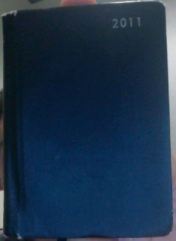
Boring, but true: two Saturdays ago, I lost my 2011 diary. It was my favoured model, the really tiny WHSmith "Week to View" with a little pencil in the spine, in black. (One year I went nuts and opted for the silver one.) It costs £4.49. It is not through abject Luddism that I choose to enter my appointments in a book, made of paper, which you cannot "tether" or "sync" without laboriously copying information from it into another document using the pencil. It was Saturday 19 November.
I had noted down a couple of online booking references in my diary, with the pencil, and for that reason I took it out of my bag when I was picking the tickets up at the Curzon in Soho, on my way home from 6 Music. I know I put the diary back in my bag, in a zip-up compartment, but that was the last time I could swear that I still had it.
I noticed on the following Monday morning that my diary was not in its normal pocket. I panicked. I don't lose things very often, and I know where all my things are. I don't much like the shoulder bag I am using currently. The strap broke on my last one, which was a promotional item given to me by the kind people at FX, so, rather than fork out for a new one, I put an old one given to me many years ago by the kind people at record label V2 back into service. It's a bit bulky and badly designed, and I can't say I like the zip-up pockets on it. I occasionally think to myself, "I'm going to lose something out of the bag at some stage." Well, it had happened.
Here's the weird part about losing a diary – that is, a physical diary, and one that is not backed up electronically – even one that only has about five weeks left to run on it: you suddenly become insecure about your life. I had a lot of fairly detailed appointments and reminders pencilled into it – Radio Times schedule changes in the run-up to Christmas, some moved Guardian recording dates, one Christmas lunch and a number of cinema bookings. By checking back through emails, I was able to recover most of them but, for instance, on Thursday, which I spent all day in the British Library, writing Mr Blue Sky, I could have sworn I had something in the diary. All day I imagined my phone vibrating and somebody asking those dread words, "Where are you?"
Thankfully, I survived the week. Last Saturday I bought a brand new diary for 2012 – yes, a tiny black one from WHSmith for £4.49, "Week to View" – and planned to use the frankly lumpy iCal program on my MacBook to see me through to the end of 2011. I don't much like it, I'll be honest. I like to write things down. In pencil. In a book. And carry the book around with me at all times. And lose it. I knew all this already, and I didn't need to lose a diary to discover these self-evident truths about myself. I felt stupid and careless for losing it. I'd had a pretty grumpy week, and this simple material loss seemed to sum up my self-pity.
And then …
On Sunday – that's eight days after losing my diary – I found it. Where? In another pocket of my bag? No. Under my bedside table? No. Beneath something on my desk at Radio Times? No. I was walking down my street on Sunday afternoon, and, by glancing down at precisely the right moment, I caught sight of a small black book just sitting on the pavement, in the shadow of a wall, in a patch of moss. It's black. It hides in shadows. But I saw the "2011″ picked out in traditional silver. For a split second, I thought it was somebody else's diary, and then, in the next split second, it dawned on me that I was a very lucky man.
Oddly, my street had been swept by the council only last week, but they had missed this little black book in the mossy shadows. And I got it back. It sort of doesn't matter in the broader scheme of things, but, you know, in the current economic gloom, it's good to find something that you lost. It's uplifting to experience some good fortune. I could easily have walked past the diary and never seen it. It was a tiny bit damp but I've dried it out and it's back in service until the end of 2011. Hooray.
I don't believe in miracles. But this was one.








November 28, 2011
Full English
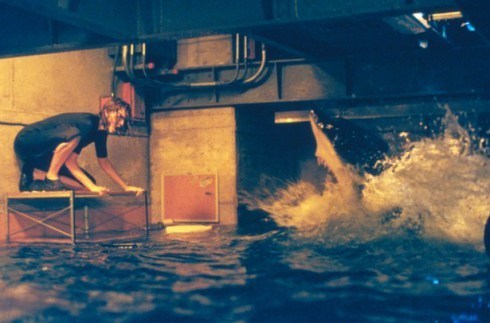
No, not that one. This one.
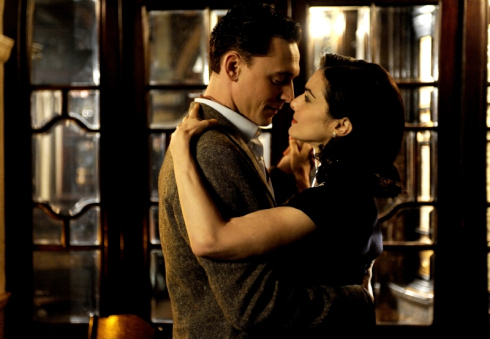
Went to see The Deep Blue Sea for the second time at the weekend. Always the mark of a special film. Adapted and directed by the near-sanctified Terrence Davies, I saw it during the London Film Festival, whose closing gala it formed in October. I was dying to see it again. Based on a Terrence Rattigan play I'd never heard of, let alone seen (but then again, Davies wasn't familiar with it either before being commissioned to make something for Rattigan's centenary, and only knew the 1955 film starring Vivien Leigh and Kenneth More), I came to it with no foreknowledge. There's a review on the IMdb by a devotee of the play and the theatre who despises it for the liberties Davies has taken with the text. Not only did I not notice any of these, I don't see a problem with adapting a theatrical work for the screen per se; the two are entirely different mediums.
In the screen version, which opens with a wordless, nine-minute montage against Samuel Barber's fiercely and torridly melodramatic Concerto For Violin and Orchestra that blows your socks off, Davies by and large sticks to the claustrophobic Ladbroke Grove boarding house of the play and only "opens out" in flashbacks. His version is cinematic in both the sense of the fractured narrative and in the pure technical achievement of he and his cinematographer Florien Hoffmeister in recreating not only the period look of colourless postwar England but the hazy, soft-focus ambience of ill-lit rooms and streets. It's very cleverly done, with characters in a state of near-darkness even during daylight. You find you are squinting at the screen, which might not be very good for your eyesight, but it's good for your absorption into the milieu of the era ("around 1950," according to the caption, which, we must remember, was "around" seven years before the end of rationing in this country).
Hester, the wife of Simon Russell Beale's starchy but decent judge who leaves him for strutting but shallow RAF pilot Tom Hiddleston (so good this year in Archipelago), seems to be the role of a lifetime for Rachel Weisz, who captures the character's sadness, her rebellious streak and her lust for life. I have no idea how Vivien Leigh played her – although I'd like to see Anatole Litvak's film now – or how she is played onstage. In this, I was able to appreciate the story and the performances on their own merits. This is a gorgeous, romantic film; small and intimate (a chamber piece, in fact) but one that speaks loudly of the great shifts in society that occurred after the war had united us and then left us with a lot of bombed-out streets and even more nagging questions about where we all fitted back in.
Hester and Freddie's landlady, Mrs Elton, played brilliantly on the right side of caricature by Anne Mitchell, says plenty about about the time with her wish to uphold decency in her house, another of whose tenants seems to be a doctor who was struck off for some unmentioned reason, and, like the unfaithful "Lady" Hester, is living in some kind of sin. Mrs Elton's own husband is clearly dying, but the love she shows to him – the kind that meant even bad marriages were not abandoned as the more modern Hester has abandoned hers – gives The Deep Blue Sea one of its most moving moments. (Was it in the play? I don't know. I've read that the excruciating flashbacks to Hester staying at her mother-in-law's were added in by Davies. These may not have been Rattigan's, but they help to round out the repressed, near-Victorian marriage she felt trapped in, so bring them on.)
I met and interviewed Terrence Davies once, on Radio 4, and felt privileged to be in the presence of the filmmaker behind Distant Voices, Still Lives. He's like our Terrence Malick (why is everybody called Terrence?) – he doesn't make that many films, but those that he does make form an identifiable body of work. There is communal singing in The Deep Blue Sea which I'll go out on a limb and say must have been added in by Davies, who longs for those days before jukeboxes and video screens. He was a highly irascible and passionate man in interview (we were discussing the state of British film, if I remember correctly), and if you think his fictions are autobiographical – and they are, even this one – then seek out Of Time And The City, his elegaic personal journey through the history of his native Liverpool. It's captivating. And funny. And irascible. If he likes the past so much, why doesn't he go and live there? Oh yes, he does.
At the Saturday afternoon screening at the Curzon, I was among only two people in the pleasingly full cinema with dark hair. Though this shouldn't just be one for the oldies, it's good to know that some films are being made for people over 50 who might not want guts and violence every time they go to the pictures. (Two white-haired people left after about 15 minutes, nine of which comprised that stirring Barber prologue; I wonder what they thought they were going to get?)








November 26, 2011
We are the 99%
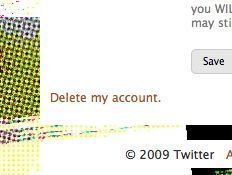
I've noticed, as the well-known social networking site Twitter has grown exponentially, and with it my total number of "followers" (don't really dig that term, but you get the jargon), that 99% of the people I interact with on there are fine – they get it, they use it for good and not evil, and they stay inside the lines of etiquette and decency. But the 1% who ruin it – the trolls, the attention-seekers, the bullies, the idiots, the spammers, the "bots" – seem ever more apparent. Some days, the 1% have the power to make you think Twitter is a bad thing and that you'd be better off without it. And then the 99% hove back into view, and you realise that it's actually alright.
If you don't do Twitter, I am not an evangelist for it, and in many ways, you're probably better off without it, unless you actually require a constant distraction from the job in hand. I joined it for 24 hours as a typically mercurial experiment in February 2009. While suffering from writer's block, although an initial skeptic, I joined on February 18, and cancelled my account on February 19. I decreed that Twitter was for "a passing fad for stalkers, narcissists and people who talk to themselves." I was right. It is. Albeit not passing just yet. Which is why I rejoined, later that year, I guess. I don't have the exact date, but I seem to remember Tweeting about 28 Weeks Later … when it was on the telly, and quite enjoying the process and the banter. I was, it should be noted, in on my own that evening.
I have developed a love-hate relationship with it. It's useful as a message board if you want to plug something or share something, especially when you know that the people who will see the notification will by and large be the sort of people who might have a passing interest in it, as they have chosen to "follow" you. (Still using those speechmarks!) But as Richard found out when he aroused the wrath of Ricky Gervais's 840,000-odd followers, you can only "vet" your followers up to a point. The law of averages says that when someone gets as popular as Gervais, more idiots will be among the faithful.
Maths is not my strong suit, but if I am right, and it is only 1% that spoil Twitter, then clearly, if you have 100 followers, that equates to one bad apple; if you have 800,000, it will be 8,000. That's a lotta idiots, lady! "Following" is not an exact science, but by adhering to a tip I was once given, I keep the number of people I follow down to the apposite 140 at all times. This way, I can shave a few off if, say, they've stopped Tweeting enough to make it worthwhile, or, say, started to re-Tweet too many things I am not interested in, or, in fact, for no reason whatsoever other than I wish to add someone and need to tend to the 140-followee total. That's just pruning.
I would not ordinarily flatter myself that anybody I follow would notice, never mind care, if I unfollowed them; unfortunately, this is not always the case, as some people really keep an eye on their total number of followers and notice if it goes up or down. I have no wish to offend anybody. I don't follow Stephen Fry. I'm sure he doesn't care. I stopped following two people who I know in real life, as they Tweeted too much, and to each other, so my timeline was permanently filled with their in-jokey conversations. It's no insult to them. A change is as good as a rest sometimes. I enjoy sculpting the timline by adding and subtracting from it – that's why Twitter is appealing: you can, and should, tailor it to your needs.
A recent example of Twitter being a pain in the arse. On Monday, I was in a pretty bad mood, and Tweeted what was a heartfelt observation about the fact that we should be ashamed to live in a country where old people might not turn their central heating on because they can't afford it. I am appalled by a lot of things the Tories are doing, but cutting the pensioners' winter fuel top-up payment is particularly cruel and heinous, especially when utility prices are soaring and energy companies are lining their pockets as a result. (I doubt a single member of the Tory cabinet has an elderly relative who can't afford their heating bills. To them, it would be an abstract proposition.)
Anyway, because James Corden follows me and saw the Tweet, he re-Tweeted it. I was surprised by this, but happy that it had struck him as true. Unfortunately, James Corden has 1.3 million followers. (Yes, Ricky Gervais, James Corden is more popular than you! Hey, it's not a popularity contest. Or is it?!) Although I had not invited it, I suddenly had an influx of new followers – people who saw my Tweet re-Tweeted by James Corden and decided they would follow me because of it. This is the weird, viral and exponential way Twitter works. I don't mind people following me. I'm sure there are funnier, more profound and more informative Tweeters than me, but frankly, who cares? I'm not really on there to increase a meaningless number at the top right hand side of a webpage.
The weird thing is, because my Tweet about old people and winter fuel had been re-Tweeted to a potential 1.3 million new people, I had a lot of comments of a type I wouldn't normally expect. Some were just pedantic, although quite why you could read a Tweet about old people and winter fuel and immediately feel the immediate need to remind me that it's not just old people who can't afford to turn on the central heating, I do not know. Did the people who self-righteously responded in this way really think that my compassion for old people in winter was exclusively reserved for them? I found myself challenged by people I'd never heard from before – people I'd never met, naturally – because I wrote something heartfelt about old people and, in those 140 characters, failed to offer a series of caveats about disabled people, young people on low incomes, families on low incomes and anybody else who might also have trouble paying their energy bills. On top of all this increased volume of traffic to deal with – and I am soppy enough to reply to people I have never met if I feel they have misunderstood me, which takes both time and emotional energy, as Richard found out with the Gervais "mong"-callers – I also received a small number of comments from right-wing people.
Now, I don't, by and large, attract right wing people. I think my woolly liberal views are fairly well know. However, right wing thinking can rise to the surface without warning. And, again inevitably, among James Corden's 1.3 million followers, there are bound to be some Tories. Hey, he might be one, I have no idea of his political views. (I rather suspect not, as it happens.) So, I had to deal with people actually sincerely saying that they thought old people should have saved up more diligently if they can't afford to pay their heating bills, or that, hey, their nan has enough money to pay her bills, so why don't other pensioners? Or else they asked, rhetorically, why they should subsidise lazy old people with their taxes? It was fairly easy to deal with these people: block them. It's the best response. These people are not going to like seeing future Tweets from me if this is the way they think, so I'm doing them a favour.
Blocking is something I do more and more. Because of the fiction of my podcast relationship with Richard, I've put up with people calling me names over the last three years as I understand that they do it because they think it's OK, or that I will find it hilarious. I often block people whose tone I don't like, because it's the most efficient way of maintaining my sanity. I only follow 140 people, some famous, some not, some people I know as friends, others whom I have never met but correspond with in a genial manner as if we are pen pals. Because I feel it is polite to reply to people who follow me, I keep an eye on "@" mentions of my name and answer as many questions as I practically can. Again, guess what, 99% of these exchanges are polite and positive.
But the 1%, which is growing exponentially, never fails to dismay me. I'm not threatening to leave Twitter. 99% of it is still essentially harmless, and in many ways heartwarming. By mentioning @CatsProtection yesterday, I found myself in a flurry of cat-loving Tweets and there can be no harm in that when you've had a pretty horrible week. I wrote that blog entry about small DIY record labels in the week, and the link was handed around by like-minded indie enthusiasts and bands too, which was lovely. Within certain constituencies, there isn't even a 1%.
But it is as well to remember that Twitter's critical mass, and its part-of-the-furniture status within every media organisation in the world (it seems insane that as recently as last year presenters were being advised at 6 Music not to go on about Twitter too much as other social networking sites were available, whereas this year it's been embraced hard), also mean that the rise of the idiots can sometimes seem on the point of tipping over and spoiling it for everyone else.








For-broodle-sun
OK, so it turns out that I don't know how to properly pronounce the Danish word Forbrydelsen – The Killing to most of us – but at least a commenter under this week's Telly Addict TV review on the Guardian website was kind enough to point this out. For-broodle-sun, you idiots! (I must say, I really feel I am getting off lightly with the comments under Telly Addict. Users of the Guardian website are rightly fabled to be among the cruellest, bitchiest and rudest on earth. But mostly, they just engage with each other about the programmes I have reviewed, which is kind of what it's for, so God bless them.) As well as the return of The Killing to BBC4 – and I'm only watching Episode 1 for now, as I wish to binge on the rest of the nine episodes when I've got at least five or six in the Sky+ tank – I stumble across Tamara Ecclestone: Billion $$ Girl on Channel 5 and find myself frustrated by the quality of Britain's Greatest Codebreaker on C4. The link is here.

November 24, 2011
St. John's ambience
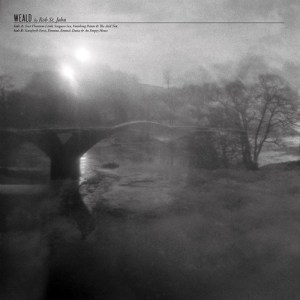
I wasn't expecting this. By which I mean I wasn't expecting 2011 to introduce so much new music into my life. Nor was I expecting Rob St. John's debut album Weald to arrive, halfway through November, and make a meaningful claim on my Top 5 albums of the year. Song, By Toad is just one small label I have been introduced to in 2011. (Visit their website if you like.) Edinburgh-based, it grew out of a blog and seems to throb at the centre of a whole DIY scene, putting many of its releases out on vinyl. You may have heard Meursault – they're on Song, By Toad. Rob St. John makes melancholy, pastoral folk-blues, his voice as deep and meaningful as Ian Curtis's, or Stuart Staples', and Weald seems to be something of a concept album linking his Lancashire birthplace with his adopted Edinburgh. It's haunting and elegaic and sad, and I can't stop playing it. It's out now, on vinyl, but you can hear two tracks, among others, on the label's Soundcloud.
The blame for this reawakening of my appetite for new music on small labels can be pretty much laid exclusively at the doorstep of Josie Long. Ever since being thrown together by 6 Music, Blind Date style, in June, I freely admit to being infected with her enthusiasm for independent music from the fringes. It's not that I ever forsook indie, but this century has beaten a lot of that previously cherished bias towards the independent sector out of me. As "indie" has mutated from a state of mind, an ideology, into a catch-all term for guitar music by young men who don't shave, I have grown weary of it. Meanwhile, I've found getting to the end of a whole album increasingly difficult. I'm sure it's me and not music, but since the turn of the millennium I've become more and more picky about what I'll listen to. But this year, my whole attitude to the 6 Music pigeonhole has changed: I now sift through all the advance CDs I get sent and make a concerted effort to select up to a dozen to take home, usually the ones from small labels. That's affirmative action. If something has a sleeve, or a photo, I'll often overlook it. A handwritten note will catch my eye and earn at least three minutes of my time. This is how I've discovered Jonnie Common, Ian Humberstone and Rob St. John on Song, By Toad. And Lymes on Mollusc records. It's how I ended up listening to Death Valley Screamers, We Have Band, Tom Eno, Mint Julep, Fireworks Night, The Lovely Eggs, Martin John Henry, Letting Up Despite Great Faults, Heart Kills Giant and, only this week, Naomi Hates Humans. (I also listened to countless others that I didn't like. There's still a door policy.)
Hey, my tastes are pretty vanilla in other respects. You know I like Adele, and she's one of the biggest selling artists of the year. I also hold a torch for Elbow, and Manic Street Preachers, who are played on Radio 2. And Metronomy, Ghostpoet, the Horrors and Anna Calvi are all straight off the Mercury Prize nominations list. But I will say that letting the output of small labels into my life has coloured it in a bit. And Rob St. John's Weald is just one of those colours.
I am of an age where cynicism is a way of life. I have a tendency towards grumpiness that is definitely index-linked with my advancing years. I am in many ways blasé and jaded. But adolescent excitement is, it seems, still a possibility.
Josie and I will be on until December 17. After that, we don't know. But it's been an enjoyable run that has done my greying soul the world of good.








November 19, 2011
Vampire, weak end
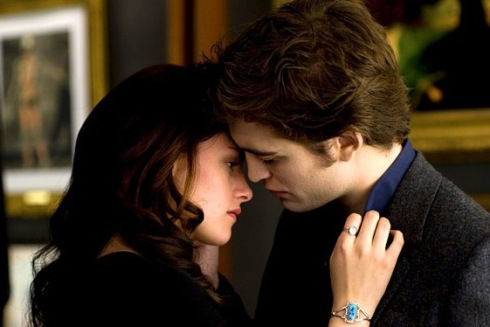
OMG. Went to the Curzon yesterday afternoon to be among the first teenage girls to catch the penultimate installment in the Twilight saga: Breaking Dawn Pt 1. As with all movie franchises based on popular novels, the studio has chopped the final part into two, so as to wring as much money as possible from the devotees who've made it such a box office success. There's nothing like treating your captive audience as mugs, eh? If they're stupid enough to effectively pay twice to see the fourth and final part, then fuck 'em, right? I am not a devotee of Stephanie Meyer's novels, but I have been pretty faithful to the films, hooked in not by the same things that hook in teenage girls, but by a sense of deep astonishment that this passes as entertainment among today's adolescent goths.
I admit, I saw New Moon, the second film, in 2009, before I saw the first, Twilight. And as far as I know, even, ahem, "Twihards" think the second film inferior to the first. It is. In it, very little actually happens beyond Bella and Edward and Jakob mooning over each other near a forest. Things picked up a bit, plotwise, in last year's Eclipse, in that more people seemed to be trying to kill other people, but oh boy, do things slow down again in Breaking Dawn.
If this film, which lasts the full 117 minutes, is faithful to the book, then let's hope it's the boring half. Honestly, for all that actually happens, they could have dashed this one off in about 40 minutes. My guess – and it is a guess – is that the fourth book doesn't have enough in it to merit an eventual 230 minute running time over two installments. But Summit Entertainment, who have thus far taken $1.8 billion with their hit series, couldn't resist dragging it out. I don't know if you care or not, but Bella, the pallid human, and Edward, the pallid vampire, get married in Breaking Dawn, and – no spoilers, as real fans know this already, and it's in the trailer – Bella gets pregnant. But with what? That is essentially the plot. There are more smoulder-offs between Edward and Jakob, and more teasing between Bella and Jakob, and – new thrill! – some marital sex between Edward and Bella (chastely shown for a 12A audience), but it's more of the same other than that.
Only in a film this desperate to stretch out the material over two parts would a wedding scene actually include all the speeches. The action only really picks up in the second hour, and the biggest plot-driver occurs in a post-credits teaser for Pt 2. Hey, stay to the end, kids! They're making you cough up twice for this, so make sure you drain every last drop out of your first visit to the cinema.
My love-hate relationship with Twilight – or my bafflement-hate relationship, to be more precise – is stoked by the underwhelming presence of stars Robert Pattinson and Kristen Stewart, who seem to exist in a permanent vegetative state. Their characters are so in love they will, we are told, risk everything for the other, not least social exclusion, possible infection and death. And yet, their expressions suggest little more than irritation. Stewart is particularly inexpressive and inarticulate as an actor. There's so much apparently going on beneath the surface and yet, little evidence from where I'm sitting. (There are some of those computer-generated keyhole surgery shots inside Bella's body in Breaking Dawn, racing through her veins, and it's a shock to see that something is truly going on under her pallid skin.) Gosh, I hope teenagers aren't like this in real life.
I guess I will have to see Pt 2 of Breaking Dawn whenever it comes out – which will be at the exact moment the accountants and marketing departments decide it will maximise potential profit margins – but I will do so only grudgingly. They've got me. I resent them for that. I know I'm not the target audience (I was the only male, and only one of two people not in a school uniform at yesterday's 3pm showing), but neither am I Harry Potter's and I can easily get why that's so popular. I wonder if the demographically targeted youngsters around me enjoyed it. Two girls in the row behind kept laughing. Should they have been? Isn't it all supposed to be rather grave?
Actually, the CGI wolves were quite exciting.








Carry on up the jungle
As well as lamenting the passing of Shooting Stars, on this week's very-slightly-different-looking Telly Addict, I'm reviewing I'm A Celebrity … Get Me Out Of Here on ITV1, and two very different shows on BBC2, namely, Rev and Pan Am.
If you're not already a convert to Rev – and this is series two, so you're going to need to get the DVD – there are a couple of clips here, and they show just how lovely the writing, by co-creator James Wood, and acting, from Tom Hollander, Olivia Colman and the rest of the cast, are. As I say in my review, Wood seems to revel in the art of conversation. There's story here, too, and character development, but the joy lies in the interaction between Hollander's Anglican priest and, well, whoever he happens to be interacting with. I love the humility of Hollander's performance; in many of the show's best scenes, he says much less than whoever he's talking to – Steve Evets' church groupie, Miles Jupp's lay reader, Simon McBurney's archdeacon, Hugh Bonneville's media vicar – and yet he says just as much with his expressions and his faltering reactions. This seems of a piece with the job he's portraying – a priest is often called upon to listen, and to assess, and then to react. It's beautiful stuff. If Fresh Meat is the best new British comedy of 2011, Rev is surely the best returning British comedy.
I shall be reviewing The Killing II next week.








Andrew Collins's Blog
- Andrew Collins's profile
- 8 followers


